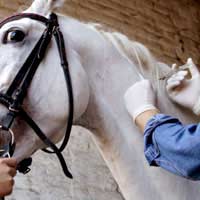Preventing Illness in Horses

Horses have complicated health needs. Just like humans they will get ill from time to time and there will be nothing you can do to prevent it. But there is plenty you can do to prevent some illnesses and minimise the risk of others. A hygienic stable and a clean horse will lead to a higher level of health and a happier horse and rider.
The horse needs a balanced diet, fresh water and good shelter – these are his basic needs. But there are other things he should be able to expect from you as well, such as prevention of injury, regular inspections and good vet care.
Parasites
Horses are susceptible to parasites, especially if they live outside. Most parasites can generally be controlled but owners should do all they can to minimise them. The easiest way to do this is regularly inspect the horse for external parasites and a regular programme of worming for internal ones.Worms are the most common internal parasites and to avoid your horse picking them up, you should make sure you remove all droppings and always keep him clean. Worm control is usually useful as a preventative measure although your vet will advise on this.
Good grooming will allow you to check for external parasites including lice and flies. If they are not treated as soon as they are spotted, these parasites can lead to worse problems such as colic. So, always pay careful attention when grooming and if the horse is sharing stables with a horse which has lice – treat your animal too to prevent him catching them.
Colic
Colic is a common illness and generally refers to abdominal pain of varying severity. Much of the time colic can be prevented, but not always, and in these cases, veterinary advice should be sought as soon as possible.Colic can be caused by stress so the horse should be kept as calm and relaxed as possible at all times. Exercising straight after food can also bring it on, much like humans getting stitch – but worse and more painful. As soon as it develops, call the vet. Warning signs include odd breathing patterns and excessive sweating.
Hooves
Horses can easily pick up problems in their hooves. All owners should take extra care over the hooves. They should be inspected every day and a farrier visited often. Clean the hooves daily and make sure the shoes are changed every six to eight weeks.Lameness can be caused if the hooves are not looked after – a disaster for the horse and rider. Horses can also develop laminitis – an inflammation of the inside hoof. This can be caused by obesity so making sure your horse is not gaining weight is one way of preventing this. Laminitis is serious and if left untreated can lead to irreversible damage.
Horses are complex animals and there are many more ailments which have not been mentioned here. But, if they are looked after well and given lots of TLC, illness will be minimised. Make sure you know the signs of common illnesses in horses. If you cannot prevent them happening in the first place then seek vet care as soon as possible. Always know your vet’s emergency numbers and do not be afraid to call if you think your horse is seriously ill. The more aware of illnesses you are, the more you can help your horse.
Business Energy With a Difference
If you are looking for business energy or need advanced solutions like remote energy monitoring, new supplies, downgrading or upgrading capacity, have a no obligation chat with Purely Energy.
To find our more get in touch here. or call 0161 521 3400.








